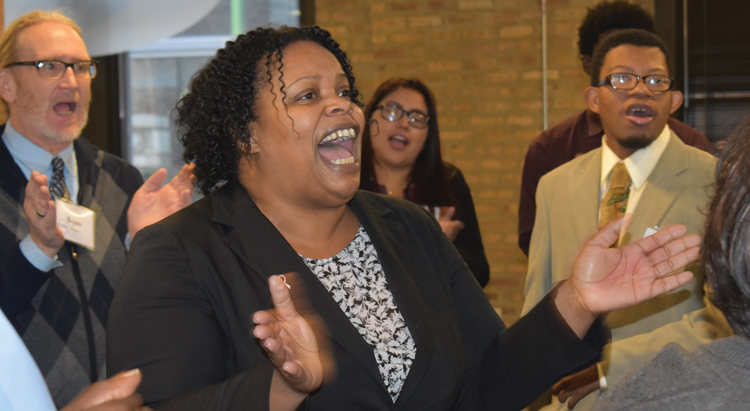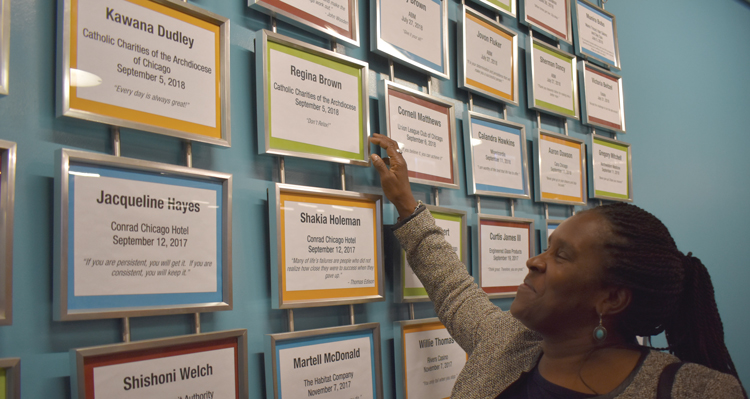Chicago nonprofit helps formerly incarcerated people find work and self-worth

Photo by Kevin Davis
Inside a loft building just west of Chicago’s downtown, a group of men and women are gathered in a circle, clapping hands, stomping their feet and singing the theme song to The Jeffersons television show.
“Well, we’re movin’ on up,” they shout. “Movin’ on up!”
The high-energy singalong sounds like a rollicking jubilee church service as the men and women welcome their peers into the circle with cheers and high fives. The gathering, known as Morning Motivation, takes place on a fall morning at Cara Chicago, a nonprofit that provides job readiness training to formerly incarcerated people, and perhaps most important, helps build their confidence.
“The notion of incarceration goes far beyond the experience itself. It becomes part of how you see yourself,” says Maria Kim, president and CEO of Cara Chicago. “We want people to have an understanding of what they can be. The jobs skills part is equally important to the self-worth part of it.”
Among those in the crowd is Regina Brown. Five years clean of drugs and alcohol, Brown has a full-time job and hope. “These motivations in the morning get you going,” she says. Participants share stories and celebrate milestones such as getting their first interview or landing a job.
Coaches help guide people recently released from prison through employment skills training as well as life coaching. “You have to be personally stable,” says Nora Vail, manager of coaching and retention. “Health, housing and child care are important. Those can jeopardize people’s ability to get a job.”
And when they’re ready to head out for job interviews, Cara has an extensive wardrobe of donated clothing that participants can borrow.
See also: ABA offers opportunities and resources to address collateral consequences
Before she came to Cara, Brown never had a real job. “Alcohol and drugs took a part of my life,” she says. “I got to a point where I didn’t want to do it anymore. My son was looking at me like I wasn’t the same mom.”
Child welfare workers took Brown’s son away after her last arrest at a crack house. A judge sentenced her to a residential treatment program, and Brown stayed in a recovery home for 18 months.
Brown had to think beyond treatment. She got a referral to Cara, which helped her land her first job—picking up trash and sweeping streets. The company that employed her, Cleanslate, is owned by Cara, which created the business to help people acquire work experience.

Regina Brown reflects on her accomplishments, which are on display at Cara. Photo by Kevin Davis.
After completing a year with the Cleanslate program, Brown got connected with the Chicago Transit Authority, which employs those with criminal records through its Second Chance Program. Again, the work was laborious—cleaning trains and buses—but it was work. Brown was forced to leave after a heart attack, but she has since landed a less labor-intensive job working for Catholic Charities in a mother-and-infant program. Cara has partnerships with businesses, nonprofits and hospitals willing to hire its graduates, and it is always seeking to encourage others.
Cara also helps clients by connecting them with lawyers at Cabrini Green Legal Aid who can help seal or expunge their records, if eligible. That’s important because while Cara can help clients with records get jobs with businesses already sympathetic to their plight, many others aren’t willing to take a chance.
“If we’re able to remove those barriers so people can work, it makes all the difference for those who are trying to overcome a criminal conviction,” says Kimberly Mills, a supervising attorney with Cabrini Green Legal Aid. “Their past doesn’t define them. Their past is often the result of trying circumstances and trauma, and sometimes it’s all about survival.”
Getting a fresh start has helped Brown, whose record was expunged, see her life in a new light. “I never thought my life would ever be this awesome,” Brown says. “There is hope. You just have to change your life, change everything about your life. There is hope. It’s real.”
This article was published in the May 2019 ABA Journal magazine with the title "Movin' on Up."



